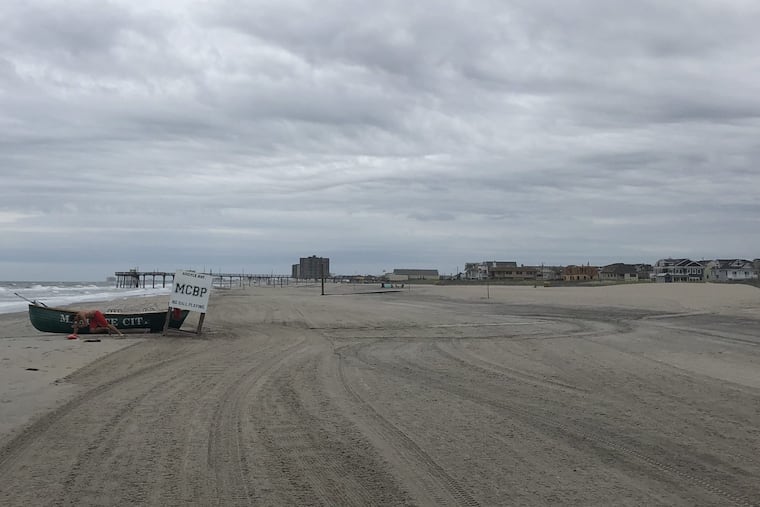Margate beaches not ‘ruined,’ experts say
The reassurances are unlikely to mollify Margate residents who fought for years to stop the dunes. Wildwood's beaches are next.

ATLANTIC CITY — Dune construction on Margate's beaches did not ruin them, three experts from the State of New Jersey, the Army Corps of Engineers, and Stockton University said Wednesday.
Margate residents and homeowners continue to insist otherwise, complaining on social media and elsewhere that the beach replenishment forced on the town despite lawsuits and referendums left their beaches unrecognizable, difficult to access, and unsightly.
"No," said David Rosenblatt, assistant commissioner for construction and engineering with the New Jersey Department of Environmental Protection, when asked whether the beaches had been "ruined," as people in Margate say.
"They're different," Rosenblatt said. "The community is better protected with wider beaches."
He acknowledged that people get used to beaches that look a certain way.
"People everywhere along the coast have an idea of their beaches," Rosenblatt said. "They grew up with them. They got used to them. When we come in and do projects with the Corps, we change the image in their minds of what the beach should be. I would only say that the beaches are indeed different. They're better protective of the community."
Rosenblatt said the outfall pipes that are being installed in five places along Margate's beaches have solved a longstanding storm-water problem.
"The people that have flooding on their streets after rainfall and after high tide are not complaining," he said. "They're appreciative of the fact that now they don't have six inches of water in their streets."
Stewart Farrell, executive director of the Coastal Research Center at Stockton, said that dunes present more of a challenge than a flat beach for the elderly and disabled, but that flat beaches leave towns vulnerable to damage after storms like Hurricane Sandy. He said towns that had beach replenishment fared better during Sandy than towns that did not.
"Yes, the dune is higher, and you do have to hike over it, and there is a pathway at the street end," Farrell said. "We can't have pedestrian access at grade. We did that at a number of places and suffered from Sandy damage. It doesn't take but a few minutes before that opening is now five times as wide as the street was originally, and now the houses are threatened. You have to walk over the dune, yes."
Keith Watson of the Army Corps of Engineers said the outfall pipes were common along the New Jersey coast. He said Margate could not opt out of the beach protection system without making the entire Absecon Island vulnerable.
"There's over 60 similar outfalls along the coast, so it's nothing new," Watson said. "Everybody's beach is their beach, and it's the best — we understand that. They're all different. That's not lost on us. Leaving holes in the system doesn't help the neighboring communities. "
The experts, speaking at a panel hosted by the William J. Hughes Center for Public Policy and the Coastal Research Center at Stockton, pronounced the state's beaches nearly six years after Sandy healthy and ready for both tourism and the hurricane season.
Rosenblatt also said the state was turning its attention to chronic back-bay flooding that was the root of much of Sandy damage, especially in the southern half of the state, and said the state is developing a regional resilience solution.
"We need to get away from the spot-to-spot emphasis that a lot of municipalities have: 'We need to fix this bulkhead here and this bulkhead here,'" he said, "and not address the entire situation."
A seemingly unlikely beach will be the focus of an upcoming project: Wildwood, a place known for its expansive beaches. But those beaches are flat, Watson pointed out, and the Corps will be building dunes, plus transferring sand to Wildwood's more needy neighbors, Wildwood Crest and North Wildwood. That project is probably a couple of years away, Watson said.
The reassurances are unlikely to mollify Margate residents who fought for years to stop the dunes. In response, some are suggesting the construction of a boardwalk extending into Margate. Others are forming a Margate Homeowners Association to advocate for property owners who do not live in town year-round and therefore are not voters.
"I don't like the way it looks and I don't like the long trek to the beach, but it looks like this is what we are stuck with," wrote Judi Weinberg on Facebook recently. "They ruined my beach."